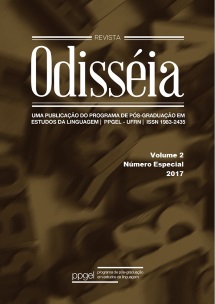Functional Discourse Grammar and acquisitional adequacy
DOI:
https://doi.org/10.21680/1983-2435.2017v2n0ID13182Palabras clave:
Functional Discourse Grammar. Social-Pragmatic theory. Language acquisition.Resumen
This article explores the compatibility of Functional Discourse Grammar with Tomasello’s (2003; 2008) Social-Pragmatic theory of language acquisition. Section 1 follows Boland (1999, 2006) and others who have claimed that theories of language should be constructed in such a way that they are compatible with what is known about the process of first language acquisition. In section 2, I will briefly explore the main approaches to the study of language acquisition in current linguistics and I will claim that a functional theory of language should preferably be compatible with a constructivist approach, given the paramount role they confer on social, communicative and cultural factors in language acquisition. The paper will then concentrate on examining the compatibility of FDG with Tomasello’s (2003, 2008) theory of language acquisition. My conclusion will be that many aspects of the internal architecture of FDG and the analytical tools employed in the model find direct correlate in Tomasello’s work and thus FDG seems to be in an excellent position to meet Boland’s standard of acquisitional adequacy.
Descargas
Descargas
Publicado
Cómo citar
Número
Sección
Licencia

Este trabalho foi licenciado com uma Licença http://creativecommons.org/licenses/by-nc-sa/4.0

















